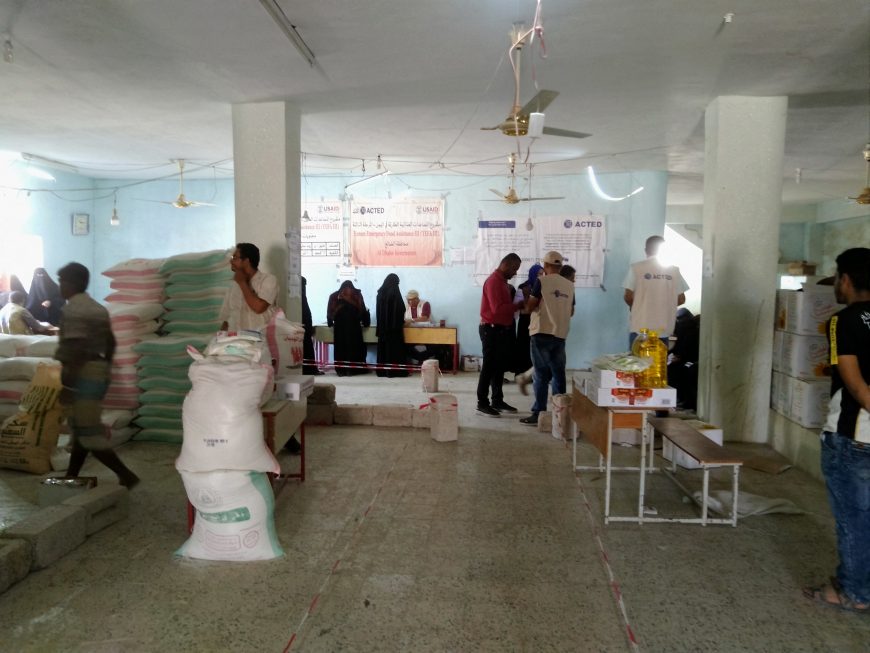The abandoned school building in Al-Fateh, Al Hussain district is bursting with life. Men wearing colorful futahs wander amidst the different vendors searching for their favorite food brands. ACTED’s new approach to food distribution was designed to tackle malnutrition in a dignified way that also gives small businesses a boost to recover now that active fighting is over in this part of the governorate.
Innovative solutions to support small businesses
Even before the conflict began in 2015, Yemen produced less than third of its own food and relied heavily on imports. Once fighting commenced, agricultural production dropped even lower, and many people lost their main sources of income. Together with the depreciation of the Yemeni currency against the dollar, and the resulting sharp rise in food prices many Yemenis don’t know where their next meal comes from.
“The only income for my large family is my pension, which is 29,000 YER (appr. 40 USD) per month. I take care of my mother, who suffered a stroke, and two of my daughters are mentally disabled and impaired in speaking. As I was unable to make ends meet, we had to reduce the amount of food we eat, which led to malnutrition in my family,” sais Mohammed, 50, from the Al Hussain district.
Villages in the mountains of Al Hussain and Ashu’yb are traditionally served by small family-run shops and informal traders, who cannot always meet all the food and commodity needs of these populations. Instead of bringing goods from larger distributors, ACTED used an innovative “Food Fair” approach and contracted local vendors in the district to bring agreed food commodities including flour, oil, beans among other items, on agreed dates.

When beneficiaries arrive, they receive a voucher at the entrance of the fair, which they can redeem at any of the vendors. Once the fair is finished, ACTED counts the voucher received by each vendor and pays the vendor the equivalent in cash.
This approach not only provides a freedom of choice between different brands, but also helps these small enterprises to stabilize their businesses and increases their profile in the target areas as traders.
Since July 2019, in partnership with FFP, ACTED has been organizing food fairs in the districts of Alhussain and Ashu’yb. Every month, 2,465 families participate in the fairs and can access essential local food commodities. Besides the food items, ACTED also disseminates key messages on nutrition and good hygiene practices through a network of Community Health Volunteers. These trainings reached over 4,500 people in the area to date.
Regular assistance that communities can rely on
Receiving the basic food items on a monthly basis means a lot to these families: as they don’t have to worry about the most essential items, they are able spend their very limited income on other needs: buying clean drinking water, medicines for a sick family member, milk for their children or food items they couldn’t even dream of before such as: cheese, tuna or meat.
Before the assistance, many families were forced to reduce the number of meals they ate per day or the quantity of food each meal, which is no longer the case. The complementary training activities successfully directed beneficiaries’ attention to the most beneficial use of their limited resources, contributing to long term positive impact.
“Thanks to the assistance we receive from ACTED, I could afford to buy medicine for my mother and daughters, something I was not able to provide before. We also received training on how to treat and store water, so I used some of my income to purchase chorine and filters. As we can eat more and drink clean water, my family is healthier thanks to the ACTED project!” said Mohammad.